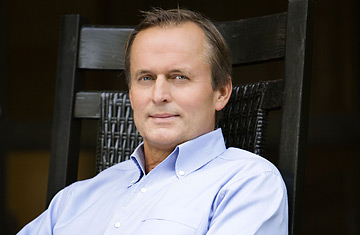
John Grisham
This former lawyer—and lawmaker—found his greatest success writing legal thrillers like The Client and A Time to Kill. His latest book, The Appeal, is out Jan. 29. John Grisham will now take your questions
Is the criminal-justice system broken? —Leslie Moyer, Wichita, Kans.
It is a mess. More than 100 people have been sent to death row who were later exonerated because they weren't guilty or fairly tried. Most criminal defendants do not get adequate representation because there are not enough public defenders to represent them. There is a lot that is wrong.
You recently wrote your first nonfiction book, The Innocent Man. Will you write more like it? —Anne Sherwood Kansas City, Mo.
No. Nonfiction is too much work. I'm too lazy to do all the research. I actually never thought about [writing nonfiction], but when I saw the story, I knew I had to write it.
You always root for the underdog. What drives that? —Tom Roberts, Yangzhou, China
I was a lawyer for 10 years—a short time, but it molded me into who I am. My clients were little people fighting big corporations, so it was a natural thing to not only represent the little guy but also to pull for him—it's the American way. That is, until the little guy gets to the top, and then we can't wait to see him fail. [Laughs.]
Your stories typically feature at least one slimy attorney. Are most lawyers like that? —Grace Hall, Rosedale, N.Y.
Not a lot. But there are enough of the slimy ones to juice up the profession and create a lot of good stories. Nobody wants to read about the honest lawyer down the street who does real estate loans and wills. If you want to sell books, you have to write about the interesting lawyers—the guys who steal all the money and take off. That's the fun stuff.
Has the legal world ever reacted negatively to your work? —Diana Parrish, Boston
There have been tons of negative reactions. I have been routinely trounced by lawyers and legal critics, but I couldn't care less. A huge part of my readership is made up of lawyers, and every book was inspired, in some part, by something that really happened.
You churn out a book almost every year. Does that impact the quality? —Cynthia Moyer, Salt Lake City
I don't think so, because if I had more time, I wouldn't use it. I'd wait until the last three months and write the book. I learned how to procrastinate in law school, I perfected it as I practiced law, and now I am an expert. I've written stuff when I had plenty of time, and it wasn't very good.
Do you try to put Christian sentiments into your books? —Steve Bohannon, Philadelphia
I'm a Christian, and those beliefs occasionally come out in the books. One thing you really have to watch as a writer is getting on a soapbox or pulpit about anything. You don't want to alienate readers.
If you had to be one of your protagonists, who would it be? —Luis Garcia, Celaya, Mexico
I keep going back to Rudy Baylor from The Rainmaker. He got out of the legal profession, found a girl, packed up his car and said, "I am out of here." That is what I always wanted to do when I was a lawyer. I never wanted to go back to the office.
You are a big baseball fan. What was your reaction to the Mitchell Report on steroids? —Ava Reed, Los Angeles
It was probably the darkest day in modern baseball history. For the rest of our lives we will look at the inflated statistics and some of the so-called stars who put up those numbers and doubt the authenticity. Hopefully, it is behind us, but I am not sure it is.
You used to serve in the Mississippi House of Representatives. If your friend Senator Hillary Clinton wins the presidential election, will you join her Cabinet? —Joseph Saucedo, Seattle
I would not re-enter politics under any circumstances. I asked Hillary at a fund raiser in front of a thousand people if I could be appointed as the U.S. ambassador to France, so I could live in Paris. She said no. That is the only job I want, so I am out of luck.
